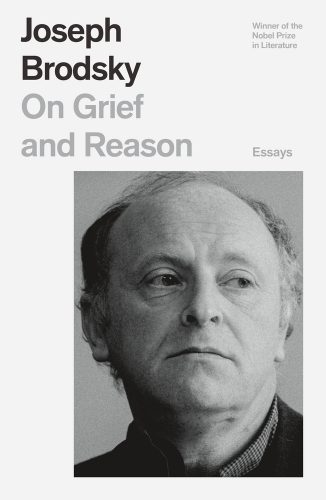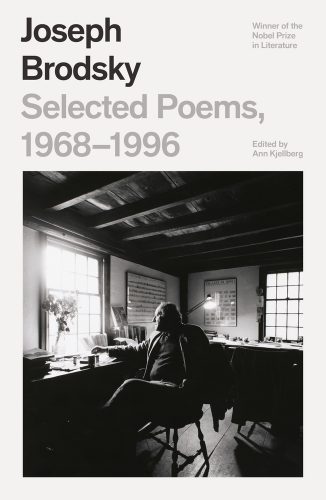Poetry and Prose Review: Joseph Brodsky — Revisiting an Icon
By Jim Kates
For a generation of Russians, Joseph Brodsky was the poet, almost a code-word in the discourse of the intelligentsia, like Nabokov.
Joseph Brodsky: Watermark (144 pages, $16); Less Than One, Selected Essays (512 pages, $22); On Grief and Reason, Essays (495 pages, $22); Selected Poems 1968-1996 (192 pages, $18). New Editions from Farrar, Straus and Giroux, 2020.

Donald Hall once wrote me to complain. (“Wrote” meant a postcard.) I had referred to him in a review as a New Hampshire institution, and he did not feel very institutional. He was not part of the Establishment, he protested. In a return postcard, I asked him, “If you’re not part of the Establishment, then who is?” His answer: Brodsky.
How did Joseph Brodsky move from being a young Russian poet, one of Anna Akhmatova’s four “orphans” in her old age, to becoming a sacrificial knight in the Cold-War chess game, to ending up a Nobel-winning American poet of such institutional stature? One reason for the transformation has to do with the quality of his poetry, of course, but the qualities that gave new life to his Russian verse never really made it into the elegant translations of others and his own gauche English versions. Part of it was politics — first, the ham-fisted politics of Soviet anticulture, which turned the young poet into a countercultural hero and an international symbol; and then his own carefully crafted politics when he entered the American literary scene. It was no accident how he picked his way among the prominent poets who wanted to serve as his translators. He chose them carefully as much for their own spheres of influence as for their skills. Once he invested his work in them, he had it made in the shade. Other, equally qualified but more plebeian translators, he left behind. And then he turned his own hand to English verse; too often he sounded like a poor imitator of Richard Wilbur or Anthony Hecht.
In the late Soviet Union, Brodsky became — and I don’t use the word lightly in its NPR overuse — an icon. The independent-minded poet Tatiana Shcherbina displayed the poet’s photo on her wall and boasted of having made his acquaintance at a poetry festival in Rotterdam. The eminently government-approved actor-director-television star Mikhail Kozakov, who lived in one of the most prestigious apartments in Moscow, also displayed a photo of himself with Brodsky, making sure foreign visitors saw it there. This was at a time when the poet’s name was forbidden to be mentioned in official circles. For a generation, he was the poet, almost a code-word in the discourse of the intelligentsia, like Nabokov.
Very quickly installed in the United States, Brodsky bestrode the wide world like a colossus, being both a Russian poet and an American cultural arbiter. His New York Review of Books fencing match with Denise Levertov over the righteousness of the war in Vietnam became part of the intellectual baggage of that journal. His friendships with Seamus Heaney and Derek Walcott created a kind of highbrow Rat Pack.
There is no denying that Brodsky earned his status.
In honor of what would have been Brodsky’s 80th birthday this year, the poet’s estate has reissued four of his books: two collections of essays, one volume of selected poems, and a novella-length autobiographical essay, the only book of the four that was new to me.
And so I began reviewing this broad smorgasbord of Brodsky with Watermark, a 1989 exploration of Venice, a city the poet had come to know intimately.
Often Brodsky’s prose isn’t quite purple, it’s more an annoying shade of mauve. Here he describes the woman who first comes to meet him: “The familiar flash of her pearls, thirty-two strong, echoed by the sparkle on the rim of her hazel pupil and promoted to the scattered silver of the Milky Way overhead …” Did you have to revise your reading of the first phrase after you realized that she wasn’t wearing a necklace? That kind of precious stumbling draws more attention to the writer as writer than to the writer as a perceptive observer. This woman, by the way, is never graced with a name, and others who surface in this travelogue are equally anonymous. (The most vivid personality in the essay is Olga Rudge, whom Brodsky visits with Susan Sontag, although other Names appear.) They are silhouettes viewed as if through a haze of abstraction: an aristocrat, a “rather distraught and spiteful middle-aged queen,” a “young maiden,” a gondolier.
 Brodsky’s descriptions of movement around the city and actual places are more vivid and multidimensional. Describing mirrors in a palazzo, he writes: “They all had delicate golden frames, with well-wrought floral garlands or idyllic scenes which called more attention to themselves than to their surface, since the amalgam was invariably in poor shape. In a sense, the frames were more coherent than their contents, straining, as it were, to keep them from spreading over the wall.” I couldn’t do a better job of summing up all of Watermark than this.
Brodsky’s descriptions of movement around the city and actual places are more vivid and multidimensional. Describing mirrors in a palazzo, he writes: “They all had delicate golden frames, with well-wrought floral garlands or idyllic scenes which called more attention to themselves than to their surface, since the amalgam was invariably in poor shape. In a sense, the frames were more coherent than their contents, straining, as it were, to keep them from spreading over the wall.” I couldn’t do a better job of summing up all of Watermark than this.
The two substantial volumes of essays, Less Than One (1986) and On Grief and Reason (1995) have, in their variety, stood the test of time. The political and social essays draw so deeply from his previous Soviet experience that they take on an air of historical authority even when they haven’t earned it. You don’t have to agree with Brodsky’s pronouncements to read him with pleasure: his intelligence and his principles derive from lived experiences that he shared with very few of those who embraced or opposed him among the Western intelligentsia. “Certain things come with a pulpit, though one should resist them, writer or no writer,” Brodsky sermonizes to Vaclav Havel in “Letter to a President.” He then goes on to suggest that by “giving your people Proust, Kafka, Faulkner, Platonov, Camus, or Joyce, you may turn at least one nation in the heart of Europe into a civilized people.”
Brodsky is, as you might guess, on far sounder ground writing about literature. When he writes — actually, it is a transcribed lecture — about Auden’s “September 1, 1939” in Less Than One, he writes from outside the English language, looking in, and the insights are well worth the reading. His discussion of Frost in the title essay of On Grief and Reason is particularly cogent and true to the poet. The reading of Frost is not new, but his points are very well brought out.
These essays are no accident: Frost and Auden were two poets who influenced Brodsky powerfully long before he crossed the ocean, when he was teaching himself to be a poet in the Soviet Union. Perhaps the poet’s most resonant pronouncement is the answer he gave to the prosecutor in 1964 who asked him from where he had received the right to call himself a poet. “From God,” he answered, just before was he shipped off into first internal, and then external, exile.
And so one of the last of the Cold War artifacts was born, a legend that shadowed the poems, or gave them added luster, for decades. Now, while Brodsky’s name is still honored, even revered, in some Russian literary circles, he is hardly at all followed. He continued to write in Russian, and then he wrote in English, generating attention in countries where his stature has remained high and his influence minimal.
Ann Kjellberg, Brodsky’s literary executor, writes in her introduction to Selected Poems 1968-1996, “His approach to his poetry in English has come under fire … that he forced the outcome, that he overran conventional uses of language, that he was dissonant. I’d advise readers to … dispel the enforcer within — Brodsky’s English may challenge the reader’s ear in ways that invoke unfamiliar powers in poetry and reward the challenge.” This is Brodsky’s claim to his place in the canon.
Selected Poems does not have the Russian texts, only the English by way of the authorized translations of his most illustrious colleagues, and, increasingly from the ’80s on, in his own versions. It is a small book spanning 29 years of writing, weighted toward the beginning with his earliest “greatest hits,” including “The Funeral of Bobò,” translated by Richard Wilbur, and George J. Kline’s English of “Nature Morte,” perhaps the first poem of Brodsky’s that ever made an impression on me, with its unmistakable echo of Auden:
People and things crowd in.
Eyes can be bruised and hurt
by people as well as things.
Better to live in the dark.
In the translation of “Nature Morte” in Selected Poems, 17 stanzas out of 30 have been altered from the words I had originally read in 1972. Brodsky himself had explained this: “I have taken the liberty of reworking some of the translations to bring them closer to the original [Russian], though perhaps at the expense of their smoothness. I am doubly grateful to the translators for their indulgence.”
I do not think the poet is well served by being his own translator, although the changes in “Nature Morte” come out pretty well. To my ear, Brodsky’s English verse too often sounds stilted — Kjellberg’s word is “forced” — a quality it does not have in Russian, where the artificialities and innovative rhymes are more revolutionary than they are in English. In 1976, he turned a Russian “Quintet” dedicated to Mark Strand into an English-language “Sextet” and ended with this stanza:
When you are no more, unlike the rest,
the latter may think of themselves as blessed
with the place so much safer than to the big withdrawal
of what your conscience indeed amassed.
And a fish that prophetically shines with rust
will splash in a pond and repeat your oval.
The clunky rhythm of the third line and the strained, anticlimactic part-rhyme of what is the final line of the whole poem betray the brilliance of the image of the “fish that prophetically shines with rust.”
The last poem by date (1996) in the book, “Reveille” — one of eight poems written originally in English — rocks with a mechanical rhythm and a drab complacency:
Painted by a gentle dawn
one is proud that like one’s own
planet now one will not wince
at what one is facing, since
putting up with nothing whose
company we cannot lose
hardens rocks and — rather fast —
hearts as well. But rocks will last.
Joseph Brodsky’s poems will last, too, not as the product of the blazing comet he once presented himself to be in our firmament, but as heart-hardened rock.
Jim Kates is a poet, feature journalist and reviewer, literary translator and the president and co-director of Zephyr Press, a nonprofit press that focuses on contemporary works in translation from Russia, Eastern Europe, and Asia. His latest book is Paper-thin Skin (Zephyr Press), a translation of the Kazakhstani poet Aigerim Tazhi.
Tagged: James Kates, Jim Kates, Joseph Brodsky, Less Than One, On Grief and Reason, translation Russian

Very informative and smart. Thanks for this survey of an important Russian poet in translation. For those of us who have no Russian, I wonder who his best translators may have been.